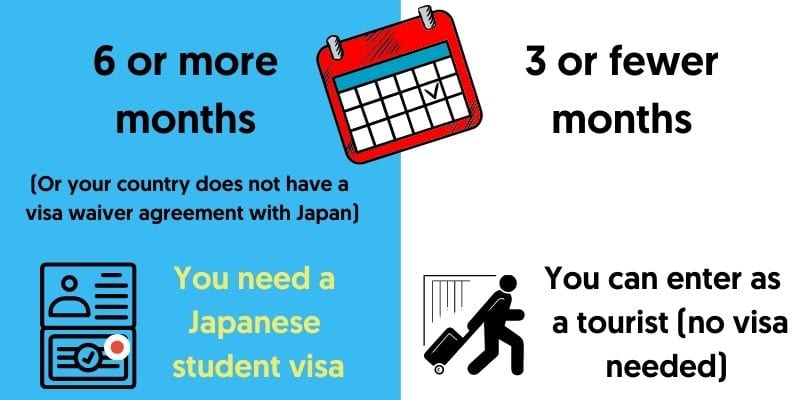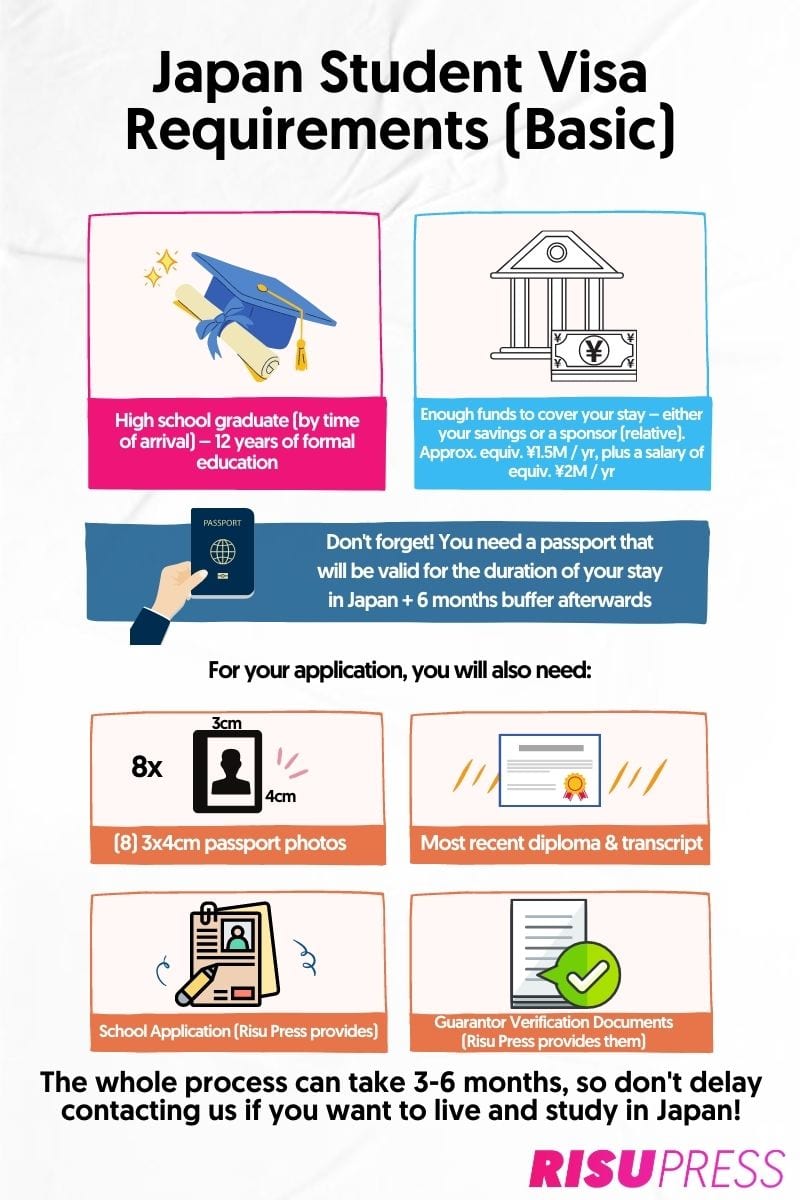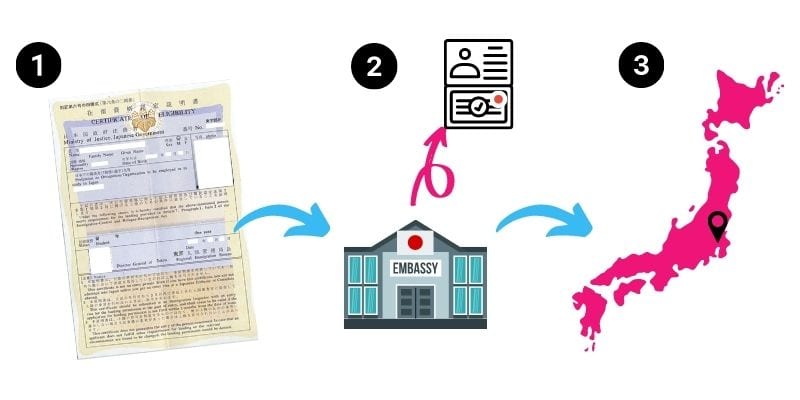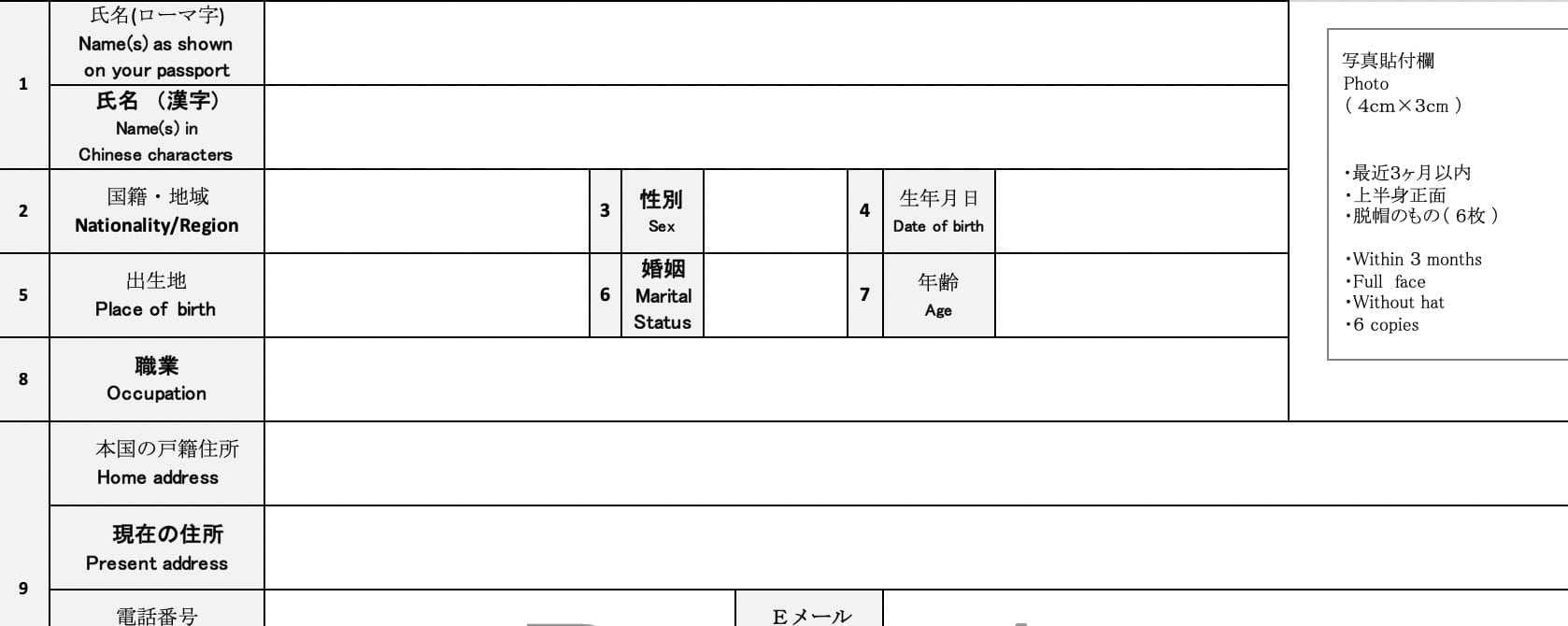No products in the cart.
February 26
Ultimate Guide to Getting a Japanese Student Visa
0 comments
February 26
0 comments
Getting a Japanese student visa doesn't have to be complicated, but you can't rush it.
Learn about the whole process for putting together a successful application package to the school of your choice, and how you can get your certificate of eligibility (and ultimately, your student visa) without a hiccup.
Like anything government related, there is a set process and a set timeline, with relatively few exceptions to the rules. However, if you plan ahead and have your documents mostly in order, the actual application should be a breeze (especially when you let us handle it for you)!
Typically, when you imagine studying at a language school in Japan, you might think you absolutely need a visa to get into Japan.
However, depending on what type of program you are interested in (long or short) and which country you are from, you may not even need to get a visa!
The short version is that if you are from a country with a visa waiver agreement with Japan, and the course you will be attending is 3 months or less, you do not need to apply for a student visa.
You can check countries with the visa waiver agreement here.

Registered schools in Japan are able to bring in students from abroad with a student visa. The key term to look for is 学校法人 gakkouhoujin (incorporated educational institution) or 大学 daigaku (university). Basically, only legally registered educational organizations certified by the Japan Ministry of Education, Culture, Sports, Science and Technology (MEXT) are able to submit applications for student visas.
When in doubt, you can reach out and ask us, or see the school homepage for more info. Generally speaking, if the school offers 6 months or longer courses, they are usually able to sponsor a student visa.
The good news is that the standards for eligibility for a student visa are not terribly demanding. However, they are very firm on these, so before you go too far down the path, make sure you meet the basic eligibility requirements!

In case you don't meet the above education requirement, but are still interested in studying in Japan, citizens of many countries can enter Japan for up to 3 months without a visa and study in short term courses at schools like Akamonkai or SAMU Language School.
If you are over the age of 30 or have been out of school for 5 years or more, the Japanese government will take a closer look at your visa application. They want to ensure that they only issue student visas to people who are serious about being a student in Japan, so you will likely need to add some confirmation to your application.
This isn't necessarily a problem – we have letter templates to help you explain your motivation to study Japanese at a language school in Japan.
It's important to note, though, that these applications can take a bit longer to process. It's a good idea to get them in as early as possible before your desired start date!
There is a defined set of steps in your application. It starts with you knowing exactly what you want to do and where you want to study.
Once you have that figured out, you will put together a package of documents (with help from us) that will satisfy the application needs of both the school you want to go to, and Japanese Immigration, so they can issue your student visa.
Check out all the schools available through our program and find the one that best suits your needs, goals, and ideal location. It's very important to note requirements for courses you might be interested in, such as business Japanese courses that require a minimum JLPT level. For the most part, though, make your decision based on location, cost, and how the core curriculum matches with your study aspirations!
It sounds like 2 separate things, but it's just one application package, so don't worry.
You can apply directly at the bottom of school info pages, or on our application page here, and this will kick off the process!
There is no commitment at this stage, but it does let us prepare the right documents for your situation and answer any questions you may have. Our staff are all trained to provide the necessary information, and we can reach out directly to schools in Japanese to get answers to any unique questions you may have. Best of all, the schools contract us directly, so there is no cost to use our services – it's completely free for you!

It's simply a document issued to the inviting organization (the school) by the Japanese Immigration Bureau as a pre-requisite to get your student visa. The inviting organization must send it to you, and you can use it to exchange for an actual visa in your passport.

This is where people have the most questions. It can take as long as 6 months from your application until you receive your student visa (though a typical scenario is 3 months), so it helps to know what's going on at each stage in the process.
Once you apply on a school page or an application page, we will send you the official application documents for your selected school/course and work with you to get them filled out.
Then, we check your application package to make sure it's correct and nothing is missing.
We pass it on to the school, and they will also do a final check.
Next, the school will submit your application and any other necessary documents to the Japanese Immigration Bureau.
♫ Waiting is the haaaardest part ~♩
Real talk though – the Japanese government is silent about the processing of your documents. It can be super frustrating if you're new to the process.
Question about how long it will take? No answer.
Are all the documents submitted correctly? Can't tell you.
Are you going to issue my COE in time? Sure hope so.
The only thing you can do at this stage is wait, and rest assured that your application has been put together properly. The Japanese government is aware of their own timelines for you getting a COE, and for getting your final visa before coming to Japan. It may feel down-to-the-wire, but it generally works out without issue.
When the government is done doing their checks on everything, the Immigration Bureau will issue a "Certificate of Eligibility" (COE) to the school, who will forward it to us.
We will then courier the COE to you.
Finally, you will make an appointment at your closest Japanese consulate. On your selected day, you bring the COE and your passport there and leave it with them.
They will send you your passport with a shiny new Japanese student visa in it, as well as return your COE (you need it when you get to Japan!)
Now you're good to go!
You can confidently approach the immigration desk at the airport in Japan and receive an official status of residence*!
Most people don't know this, but your Japanese visa is actually just your permission to enter the country. Once you have gone through immigration, they will issue you a Residence Card that has your "Status of Residence" written on it.
This is now your permission to live in Japan. Whatever date was on your visa in your passport doesn't matter anymore – it's been converted into an official status of residence.
However, most people just refer to their status of residence as a "visa" anyways, and you will probably get a weird look if you tell someone you have a 2 year SoR instead of a 2 year visa.

When you start looking at Japanese language schools, it's important to start thinking one step ahead as well, because some documents take time.
For example, your passport will need to be valid for the duration of your studies in Japan, and its best to have a buffer of 6 months validity left after your proposed study duration. Things like applying for a new passport can take time, so check out this basic list of Japanese student visa application documents.
A lot of these documents will look different (or maybe even be called different things) depending on which country you are from.
This is where we step in to help ensure the documents you are collecting for your application package are the right ones and will meet the needs of Japanese immigration.
If you're trying to go to school in Japan to learn Japanese, you may not have enough money in your savings account to last you the entire time.
That's ok!
The Japanese government expects this, so they have created a system where you can have a financial sponsor (guarantor) declare their intent to cover your finances. As part of your application for your Japanese student visa, you'll need to get some specific documents from them as well (outlined above).
In return, you should send your sponsor tons of letters and pictures of your experience abroad!

For the most part, you need to be able to show that this person:
What are the exact financial figures the Japanese government expects to see?
It can be a bit murky... This is why there's a lot of "roughly" and "about" in the recommendations you see online. However, to increase your chance of a successful Japanese student visa application, consider Japanese immigration's perspective: "higher savings & more stable salary = less chance of you working illegally."
So now you've got your student visa in hand and you've landed in Japan!
Freedom!!
Well actually, not total freedom.
There are rules around having a student visa in Japan, and unless you want to have a nice chat with the immigration department, you'll probably want to know what they are and how you can avoid having your visa (status of residence) cancelled.
To maintain your student status of residence, you must:
If you do decide to withdraw from school, the school is obligated to inform Japanese immigration that you no longer meet the requirements for your student status of residence. The government has the authority to deport you from Japan if you intend to try and stay based on a Japanese student visa without actually being enrolled in a school, so think carefully about your actions! There can be consequences.

Further to that, if you are deported from Japan for any reason, you are banned from re-entry for 5 years, and you'll have a very tough time getting a visa issued in the future.
If you plan to enter Japan on a student visa, it's best just to follow the rules and continue to be a student. If you find yourself in an impossible situation where you must leave school, it's also best to leave the country quickly as well, because your status of residence will become invalid.
You didn't think we'd leave you with all that to just memorize did you? Here's a handy checklist to make sure you have everything you need to be able to start your student visa application! Once you have this covered, and you contact us about the school you want to attend, we'll forward you the full application package.
We're standing by, ready to assist!
This process may seem complex, but you really don't need to worry about it when you work with Risu Press. We handle the details and make sure everything is submitted correctly and on time. When you apply through Risu Press, not only do you get top notch guidance at zero cost to you, you also get the best chance possible of a successful Japanese student visa application.
Go ahead – get in touch or start here to find the right school for you!
Or, if you already know where you want to study, go ahead and start your application today!
Did you like this article? Please share it around!
Tags
Get info about schools, deadlines, and opportunities, straight to your inbox.
Session expired
Please log in again. The login page will open in a new tab. After logging in you can close it and return to this page.